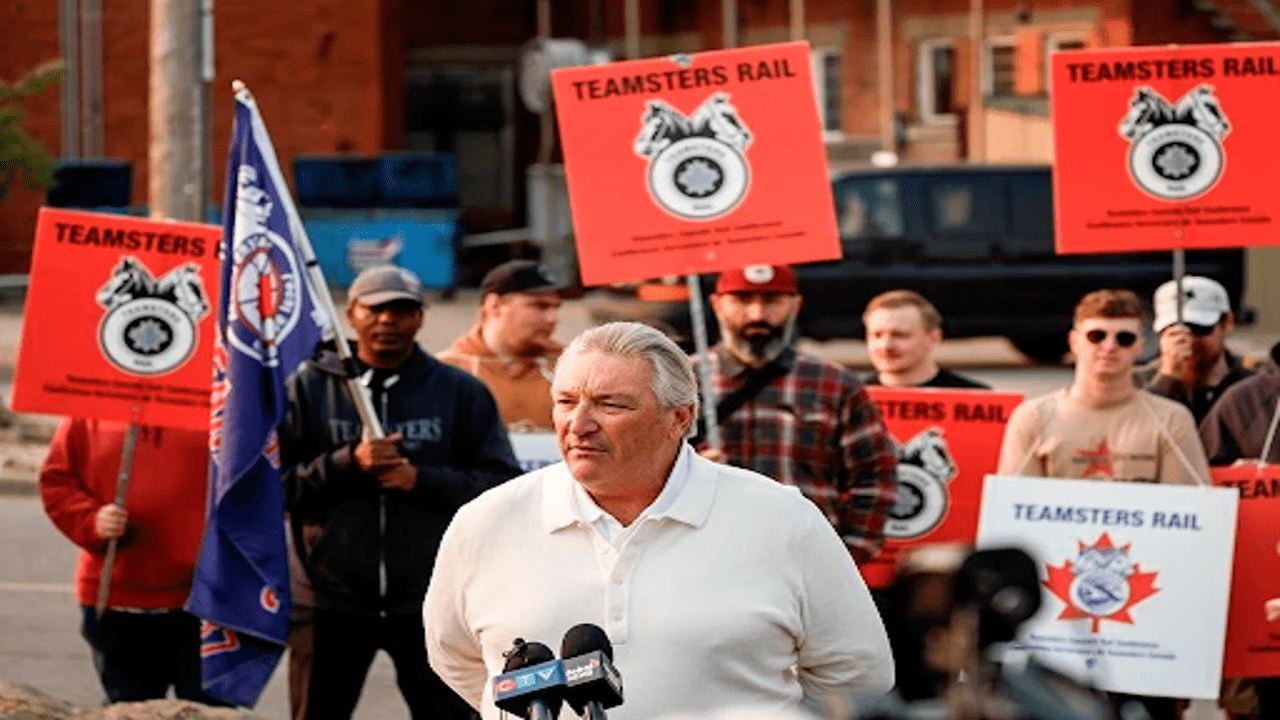
Francois Laporte, National President, Teamsters Canada, speaks to media as picketing railworkers gather at the CPKC headquarters in Calgary, Alta., Friday, Aug. 23, 2024.THE CANADIAN PRESS/Jeff McIntosh
The Canadian government is stepping in to address a nationwide rail strike involving the country's two largest rail companies. However, rail workers are resisting Ottawa's attempt to end the work stoppage and return them to their jobs.
The conflict, which has been brewing for months, came to a head early Thursday when Canadian National Railway Co. (CN) and Canadian Pacific Kansas City Ltd. (CPKC) locked out 9,300 engineers, conductors, and yard workers.
Here are the latest updates on the rail strike:
7:55 p.m.: The Teamsters Canada Rail Conference announced that a lengthy nine-hour hearing had just concluded before the Canada Industrial Relations Board (CIRB). The board had called the union, CN, and CPKC to "case management conferences" Thursday evening, with another meeting scheduled for the next morning. The union argued that the federal labor minister does not have the absolute authority to end their strike.
3:00 p.m.: British Columbia Premier David Eby expressed concerns about the potential long-term impact of the strike, stating it could be "devastating" for families reliant on port jobs in Prince Rupert and Vancouver, as well as for businesses that depend on rail transport. Eby urged both the rail companies and workers to negotiate a resolution and called on federal officials to help bring clarity to the situation quickly. He also acknowledged workers' frustrations, emphasizing their fight for "basic safety protections" and wage increases to cope with rising living costs. Eby criticized the rail companies for using their market power to "hold Canadians hostage" instead of negotiating on essential issues like safety and wages.
2:35 p.m.: Unifor, Canada's largest private-sector union, has expressed support for the rail workers. Unifor President Lana Payne accused the two rail companies of "blatant disregard for workers' rights," claiming they have united to undermine free and fair collective bargaining. In a social media post, Payne voiced concern over the federal government's plan to enforce binding arbitration, accusing the "rail cartel" of retaliating against new worker protections in the federal sector, such as anti-scab legislation and increased paid sick days.
1:38 p.m.: Perrin Beatty, head of the Canadian Chamber of Commerce, criticized the Teamsters Canada Rail Conference's decision to challenge the Labour Minister's effort to resume railway operations. Beatty expressed disappointment, warning that the move could extend the economic damage and put Canadians' livelihoods at risk.
11:10 a.m.: In a news conference in Calgary, Teamsters Canada President Francois Laporte said the union's legal team is exploring all options to fight the government’s intervention. Sean O'Brien, President of the International Brotherhood of Teamsters, also attended, promising full support from U.S. resources for workers locked out or on strike. O'Brien hinted at potential coordinated action with U.S. Teamsters but declined to provide specifics, stating, "There will be a plan in place, and they won’t like it."
10:47 a.m.: The Canada Industrial Relations Board is addressing the Labour Minister's request for binding arbitration and a back-to-work order "with utmost urgency," according to Jean-Daniel Tardif, senior director of dispute resolution services. Tardif confirmed that case management conferences were held the previous evening, and a hearing was underway, though he declined to provide further details at this time.
9:52 a.m.: The Teamsters Canada Rail Conference announced it had issued a strike notice to CN Rail, intending to begin the strike at 10 a.m. on Monday. In a letter to the railway's senior director of labor relations, union leaders emphasized their willingness to negotiate and resolve the dispute without further disruption.















